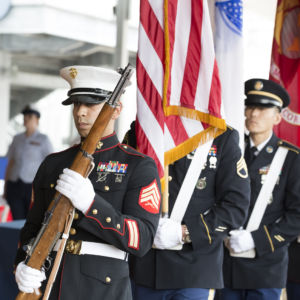Seventy-five years ago, Franklin Roosevelt delivered his landmark Four Freedoms address. The mission of the military has not changed since FDR spoke of freedom from fear, freedom from want, freedom of religion, and freedom of speech.
Yet the environment in which the military delivers that mission has evolved and changed as the threats have evolved and changed. The mission also has taken on a new dimension as national leaders have seen the military’s effectiveness in advancing freedom in ways other than directly responding to threats to our security and that of our allies.
Over the last 15 years, Americans have seen — and debated — the military’s importance in ensuring our security against international terrorism and hostile actors. Too often that debate has not included the military’s role in protecting all four freedoms and universal human rights.
FREEDOM FROM FEAR
One challenge with terrorists, insurgency groups and illicit organizations is that they capitalize on unstable environments. These non-state actors thrive in an environment where there is no security, government, development, opportunity and hope. They grow in areas where people are extremely disaffected.
Countering their threats requires security, governance and development. Security is essential because without it you cannot establish the governance that is required to deliver services. Nor can you have the development the people need to thrive and prosper.
Non-state actors, though, are difficult to target. You must look for opportunities to destroy their networks. But these networks thrive and find sanctuary among an oppressed people.
The twofold challenge for the military and law enforcement community is to target the enemy who resides and hides among innocents. You don’t want to alienate those you are there to protect. Rather, you want to protect them from those who lord fear over them.
Blunt force doesn’t work, however, without governance and development. We don’t have the ability in such an environment to achieve our objectives alone. We have to work with the host nation, who will have to ensure security, governance and development over the long term.
More often than not, we have to teach, coach, train and advise them that their security forces simply can’t go in and use their military muscle. If they want to secure the support of their people, they have to do so while preserving their human rights, freedoms and dignities.
Take the case of Afghan commandos and Special Forces. Those elements of the Afghan military have made the most strides in that nation. I have traveled around the country with them and they are a source of pride.
That’s because they are well-trained, well-armed and extremely lethal and effective. Yet they also understand the need for governance and development, along with security. When an operation is over, they engage the local people and follow up with support that makes the locals better than they were before they came in.
FREEDOM FROM WANT
The military’s first role and responsibility is to be able to respond to any number of threats. Yet economic prosperity, including the prosperity of global economy, is key to our security and freedom.
The military has an indirect role in promoting freedom here, too, through protecting the vitality of the global economy. For example, the U.S. military enables the delivery of energy as well as the shipment of goods on the seas. The Navy has the primary responsibility in keeping trade routes and key hubs open to international commerce and business.
What’s more, U.S. Strategic Command not only protects cyberspace and outer space for security reasons. It also ensures they are available for industries that depend upon them for their services and products.
The military likewise plays a direct role in ensuring human rights and core democratic values. Our military is deployed in more than 150 countries, where, at the nation’s request, we provide security, training and equipment so that those who seek to advance democracy and free markets can do so while dealing with internal and external threats.
For example, Colombia once was on the brink of being a failed state. But Colombia used U.S. military training, advice and assistance, and equipment and material to combat the drug cartels and defeat an insurgency movement.
ENSURING DEMOCRATIC FREEDOM
I was in Colombia and Ecuador on these training and advising missions for over two years. One deployment was held up six months while we waited for the State Department to vet the Colombian counter-narcotics brigade we were going to train. The brigade had officers who had been implicated in human rights violations. Ultimately, they were removed from the units.
This is a good example of how the U.S. military influences the behavior of foreign militaries. We cannot train and assist them unless they adhere to international and U.S. standards for human rights.
And once the military is deployed, it must provide human rights training to counterparts in the host nation. We had to allocate time on our training schedule to go through a block of instructions on human rights with Colombian soldiers and law enforcement officers. All kinds of interesting debates arose during those sessions.
I point this out because you must have relationships if you are going to shape and influence behavior. It may not be widely understood outside of policy circles, but the military is using those relationships to influence and shape the standards of host nation militaries.
Their standards often are not the same as ours. But there’s little way to shape and influence them unless we are working on what’s right.
The military’s role in ensuring Americans are free from fear and want is irrefutable. At the same time, it ensures the basic human rights that make up the first two of Roosevelt’s Four Freedoms.
In all of these areas, the military directly guarantees not only security and prosperity, but also human rights and freedoms.

